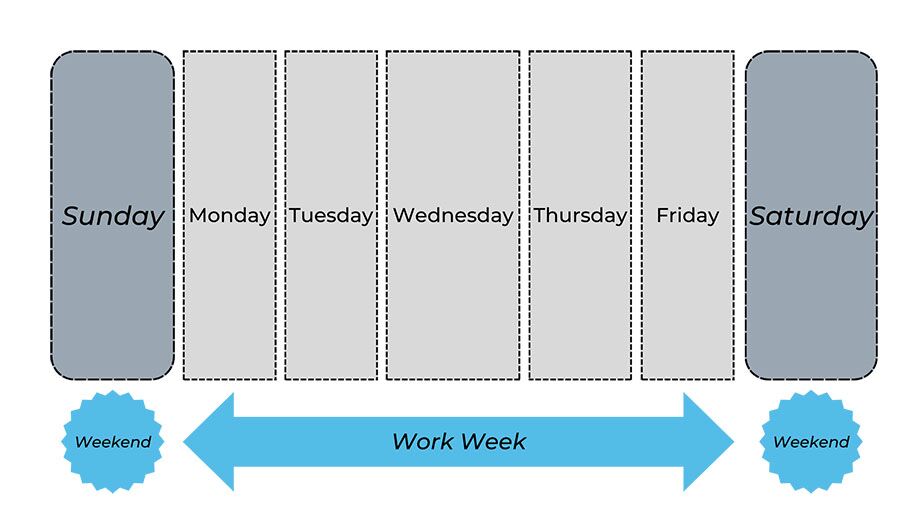Around the world, different religious groups have had a Sabbath—a day set apart for rest each week. A day to worship together, spend time with loved ones, and to just rest.
For many of these groups, this practice has deep roots and holds great spiritual significance.
In this post, we’ll look at this practice among various religious groups, and why it’s important to them. We’ll answer the following questions:
- What is the Sabbath?
- What are the earliest origins of this practice?
- What religious groups have a rest day, and why is it important to them?
- Is the Sabbath as a rest day still important for everyone?
Let’s start with what the word “Sabbath” really means.
What is the Sabbath?
According to the Merriam-Webster dictionary, the Sabbath is a day of the week that is regularly observed as a day of rest and worship.1
It’s especially common among Jews and Christians.
Jews observe their Sabbath from Friday evening to Saturday evening. Some Christian denominations also observe it this way, but a majority observe it on Sundays.
In the Bible, the word “Sabbath” comes from the Hebrew word Shabbath, or the Greek word Sabbaton2. It means “to stop, to cease, or to keep.”3
It’s a day when people stop or cease their ordinary day-to-day work. So it’s rest from daily work, and a shift to worship and commune with God.
This rest and worship can take different forms and meanings for different groups based on their beliefs. More on this later.
But for now, let’s look at the earliest recorded history of the origins of this practice.
What is the origin of the Sabbath?

Photo from Unsplash
The word Sabbath is first mentioned in the Bible in Exodus 16:21-30. This was written by Moses in the 15th Century BC.4
Here, God asks the Hebrews not to go about their daily duty of collecting manna on the seventh day of the week. Manna was a kind of food that God provided for them as they traveled in the wilderness.
They were to collect it every day to meet their needs. But on the sixth day of the week, they were to collect enough for two days—the sixth and the seventh.
Then on the seventh day, they were not to gather. And if they did, there would be nothing there.
The seventh day was to be their day of rest.
This practice was later reinforced in Exodus 20:8-11, when God gave the Ten Commandments. He said:
“Remember the Sabbath day, to keep it holy.
Six days you shall labor and do all your work, but the seventh day is the Sabbath of the Lord your God. In it you shall do no work: you, nor your son, nor your daughter, nor your male servant, nor your female servant, nor your cattle, nor your stranger who is within your gates.
For in six days the Lord made the heavens and the earth, the sea, and all that is in them, and rested the seventh day. Therefore the Lord blessed the Sabbath day and hallowed it” (NKJV).
Notice that the reason for keeping the Sabbath points to an earlier event. When God Himself rested on the seventh day after creating the world.
This account of Creation is found in Genesis 2:1-3:
“Thus the heavens and the earth, and all the host of them, were finished.
And on the seventh day God ended His work which He had done, and He rested on the seventh day from all His work which He had done.
Then God blessed the seventh day and sanctified it, because in it He rested from all His work which God had created and made” (NKJV).
So, this practice of resting one day a week has its origins at the very beginning of the world, just after Creation. Man was asked to rest on the seventh day, because God rested on it too.
In fact, since man was created on the sixth day (Genesis 1:26-31), the rest day was man’s first full day of existence!
So from the Bible’s viewpoint, this practice is a weekly celebration of the birth of the human race and a memorial of God’s creation of our amazing world.
Now, let’s look at how this practice has trickled down through the years and how different groups have kept its practice, even today, in one way or another.
What religious groups keep a day of rest, and why is it important to them?
Different religions in the world observe a rest day. Some of them are ancient, and some more recently founded. Either way, each group attaches spiritual meaning to the practice. Here’s how each group does it and why it’s important to them.
Sabbath observance in Judaism

Photo by Anton Mislawsky on Unsplash
Judaism is the religion among Jews. They keep the Sabbath5 on the seventh day of the week, from Friday evening to Saturday evening.
Jews have their origins in Israel, descended from Abraham. They’re also known as the Hebrews or Israelites.
The Sabbath practice was given to them in the Ten Commandments, as we saw earlier.
They’ve continued this practice to date.
Their reason?
God commands them to keep it in their sacred writings, the Torah. The Torah consists of the first five books of the Bible—Genesis, Exodus, Leviticus, Numbers, and Deuteronomy.
It gives three main reasons why Sabbath keeping holds great significance for Jews:
- To imitate God by resting as He rested (Exodus 20:8-11).
- As a sign of the covenant that God made with them when He led their ancestors out of slavery in Egypt (Deuteronomy 5:15).
- To empathize with their ancestors who were not allowed to keep the Sabbath during their slavery. And as an appreciation of their redemption and freedom to obey God’s commands (Deuteronomy 5:15).
Also, according to Jewish traditions called the Talmud, the Sabbath is associated with God’s personal presence. This was called the Shekhinah, or the “in-dwelling,” of God.
So Shabbat was considered a day of mystical union between God and the Jews: a time to rest and commune with Him.
And as Rabbi Abraham Joshua Heschel, a great Jewish scholar of the 20th century puts it:
“Shabbat is a ‘cathedral in time’ — a ‘place’ in time rather than space in which we develop the practices of sacred rest, and focus on being in the world rather than transforming it.”6
So for the Jews, Friday evening to Saturday evening is a special day of rest. A day that has held deep spiritual significance for millennia.
Day of rest in Christianity
Christians believe in the Bible. And based on the teachings found in the first books of the Bible and elsewhere in Scripture, most Christian groups believe in keeping one day of the week holy.
A day reserved for worship and meeting together.
But as you may have noticed, there are many sects and smaller groups (denominations) within Christianity. All believe in the Bible, but they may differ in their interpretation of various scriptural passages.
When it comes to Sabbath observance, there are two main practices:
- Those who rest on Sunday
- Those who rest on Saturday
Let’s look at each, and examples of denominations under each class.
Christians who rest on Sunday

Photo by Barbara Provenzano on Unsplash
The majority of Christianity rests on Sunday.
They call it “The Lord’s day.” A day to meet together in church and dedicate time for worship and family.
They observe the next day after the biblical Sabbath— the first day of the week, in honor of Jesus’ resurrection.
How did this change from Saturday to Sunday happen?
The change was gradual, but it was legislated in the fourth century AD.
The practice was cemented when everyone in Christendom was required by law to rest and go to church on Sunday.7
The largest Christian denomination, and that which has kept Sunday the longest, is the Roman Catholic Church. The Catholic doctrine on Sabbath observance reads as follows in their catechism:
“You shall attend Mass on Sundays and holy days of obligation and rest from servile labor.”8
It’s a day to celebrate mass, participate in the Eucharist (or communion), and meet with other believers.
According to the writings of Catholic church father Thomas Aquinas, Sunday observance helps us to give God “an outward, visible, public, and regular worship as a sign of his universal beneficence to all.”9
The second largest Christian denomination, the Eastern Orthodox Church, also observes Sunday as a rest day, much like the Catholic church.
Then came the Reformation which began in the 1400s, when many denominations came out of Catholicism. But still, most of the new (Protestant) churches continued to go to church and rest on Sunday.
Some of these Protestant denominations include:
- Baptists
- Anglicans
- Presbyterians
- Episcopalians
- Puritans
- Methodists etc.
For them, Sunday is a day to connect with God and fellow believers. A day to pause from business and secular labor, and experience holy rest.
As John Piper, a Baptist pastor and chancellor of Bethlehem College and Seminary puts it:
“The reason Christians go to church on Sunday is because we have been rescued from our sins, united with a risen, living Christ and with each other through faith in Jesus. And because of that union with Jesus and with each other, the Bible, God’s Word, calls us to regular, weekly expressions of our corporate joy and thankfulness before God in worship—not just isolated Christian individuals scattered around but corporate gatherings praying and singing and hearing God’s word and celebrating the ordinances of Jesus.”10
In the 19th century, there arose several churches that broke from these mainstream “post-reformation” churches.
A good example is the Church of Jesus Christ of Latter-day Saints led by their prophet Joseph Smith. He too urged his followers to keep Sunday by going to church.
For them, it’s a way to keep the Sabbath commandment and to give God thanks.11
From the 20th century to the present, there are many protestant Christian or evangelical churches whose members go to church on Sunday morning, but the rest of the day’s activity is up to individual discretion. Some rest at home with family, some visit and help others, and some might even go to work if they have to.
But there are some Christian groups that retained the Bible’s seventh day as the religious rest day.
Let’s look at these next.
Christians who rest on Saturday
 While most of the Christian world started to rest on Sunday, some groups maintained Saturday. They had received this practice from the Apostolic Church of the New Testament days.
While most of the Christian world started to rest on Sunday, some groups maintained Saturday. They had received this practice from the Apostolic Church of the New Testament days.
The Apostolic Church is the church formed by the disciples after Jesus went back to heaven. And they maintained the Sabbath practice handed down to them from Creation, the Ten Commandments, and in the example of Jesus (Luke 4:16; Acts 17:2).
After some time though, they were legally restricted from resting on Saturday. But they maintained the practice through centuries.
They believed in keeping all of God’s commandments, including the fourth, which requires resting on the seventh-day Sabbath.
Some of these groups include:
- The Waldenses in Italy and the Vaudois of France in the 12th century12
- Sabbatarian Anabaptists in the 1500s13
- Seventh Day Baptists in England in the 1600s14
- The Puritans of England in the 16th and 17th Centuries15
- Seventh Day Baptists in America in the late 1600s16
Then in America, there was the Advent Movement in the early-to-mid 19th century. Most of the Adventists at that time still belonged to the Protestant denominations that had their day of rest and worship on Sunday.
But some of them learned about the seventh-day Sabbath observance from the Seventh Day Baptists.
These ended up forming the Sabbatarian Adventists.
Today the most numerous of these are the Seventh-day Adventists.
They believe in obeying all Ten Commandments, including worshiping on the biblical Saturday Sabbath. For them, it’s an act of great spiritual importance, as it signifies their love and commitment to God through obedience to His Word.
They rest from sundown on Friday to sundown on Saturday.
For them, this is a time for going to:
- Worship together in church
- Share testimonies
- Have Bible studies
- Spend time in nature
- Enjoy time with family and friends
- Have quiet personal devotions
Ellen White, one of the key founders of the denomination, emphasized the importance of the Sabbath for spiritual renewal.17 It’s a day to step away from daily work and connect with God and fellow believers. It’s also a day to reach out and share love with others in the community. And apart from the spiritual significance of a weekly day of rest, Adventists have also experienced health benefits from this time of rest. Other denominations that also keep Saturday Sabbath today include:
- Church of God (Seventh Day)18
- Nazareth Baptist Church19
- Assemblies of Yahweh20
- The Church of God International21
Weekly rest days in Islam, Buddhism, and other religions

Photo by Utsman Media on Unsplash
Other world religions also have rest days.
The Muslim day of rest is Friday. They attend a special prayer session at the mosque as part of the rest day.22
Buddhists also have a day of rest called Uposatha. It varies between once in seven or eight days depending on the Lunar calendar. It’s a day of resting, meditating, listening to Buddhist teachings, and spiritual discussions.23
Other ancient religions that worshiped the sun god had Sunday as the official day of rest and feasting. It was practiced among ancient Germans, Saxons, Egyptians, and Romans.24 An example is the Sun cult25 of Sol Invictus in the Roman Empire.26
By now you may have noticed that throughout history, humans have always had a day for downtime. And this downtime usually had some spiritual significance.
Let’s look at how that is playing out in today’s modern world.
The Sabbath as a rest day is still important for everyone
As we’ve seen, humanity was created with an innate need to take some weekly time off for physical, mental, and spiritual rejuvenation.
In America, the Blue Laws instituted during the colonial era restricted work and business on Sundays. These laws ensured workers could have Sunday and any holiday as a day off, and participate in religious activities.27
Other places like New York, where there were large numbers of Jews, had the Fair Sabbath Law. This enabled Jews to rest on Saturday, then continue with business on Sunday.28
Though these laws are not actively enforced in many places, we still experience their influence through traditions and other secular institutions.
Like the reason we typically have a Monday to Friday work week. Then Saturday and Sunday is referred to as the weekend—time to rest from work, school, etc. And in some places like Israel and some Muslim countries like Iraq and Tunisia, the weekend includes Friday and Saturday.29
And in some places like Israel and some Muslim countries like Iraq and Tunisia, the weekend includes Friday and Saturday.29
There are also places like Massachusetts that mandate at least one day off work, no matter what day of the week it is. Still, they recognize the need for a weekly day of rest for the people.30
And there are many people today experimenting on the renewing effects of weekly rest days.
An example is Joel Gascoigne31 who found that his whole being responded best to a routine of one rest day and six days of work.
Though the US constitution, through the First Amendment,32 does not promote laws in favor of any religion, it continues to provide protection for a weekly rest day.33
And religious groups like the Seventh-day Adventist Church continue to advocate for religious freedom for all to worship and rest as per their convictions.34
All these tell us of our need for a day of rest, at least once a week.
We’ve seen it from God’s own example of resting after Creation, to individuals like Gascoigne who studied the benefits of having a rest day and discovered profound refreshment.
From these, we can safely conclude that a day of rest is an important practice that can be adopted by everyone.
To learn more about the health benefits of taking time to rest,
Choose an Online Bible Study
Want to keep learning? Find out more about Jesus, humanity, the plan of salvation, and how God loves you enough to sacrifice everything, just to give you a chance to choose Him.
Sometimes it can be hard to know where to start, that’s why we offer free, user-friendly, online Bible study options you can do anytime, anywhere, and at your own pace.
This online Bible school will take you through the major themes of Scripture, breaking down the Bible’s complex concepts into bite-sized pieces, which can lead you toward the answers of life’s more challenging questions.
- “Sabbath” Merriam Webster Dictionary. [↵]
- Strong’s #4521. [↵]
- Bible Study tools, Quick Reference Dictionary, Sabbath. [↵]
- “Intro to Exodus,” Biblica.com. [↵]
- My Jewish Learning: “The Significance of Shabbat.” [↵]
- Ibid. [↵]
- Vincent J. Kelly, Forbidden Sunday and Feast-Day Occupations, p. 15. [↵]
- Catholic Doors Ministry: “Catechism of the Catholic Church.” [↵]
- St. Thomas Aquinas, STh II-II 122, 4. [↵]
- John Piper, Desiring God: “Why do Christians worship together on Sundays?” February 9, 2016. [↵]
- Church of Jesuschrist.org: 6 Ways Going to Church Can Benefit Your Life.” [↵]
- Wylie, James A., History of Protestantism vol. 1, (Cross the Border Publishing, 1879), pp. 31-37. [↵]
- Kenneth A. Strand, The Sabbath in Scripture and History, Review and Herald Publishing Association, Washington DC: 2012, pp. 215-226. [↵]
- Ibid. [↵]
- Strand, pp. 229-242. [↵]
- John N. Andrews, History of the Sabbath and the First Day, Steam Press of the SDA Publishing Association, Battle Creek, MI: 1873, pp. 493-494. [↵]
- White, Ellen G., Testimonies for the Church Vol. 6, (Pacific Press Publishing Association, 1901), p. 353. [↵]
- Church of God Seventh Day [↵]
- Sarah Mc Gregor, Reuters: “Shembe is the Way for Millions in Southern Africa,” January 27, 2007. [↵]
- Assembly of Yahweh [↵]
- The Church of God International [↵]
- Britannica: “Jumah” [↵]
- Deseret News: “5-major-world-religions: How do they worship?” March 18, 2015. [↵]
- Andrews, pp. 259-260. [↵]
- Hansen Rahlf, Antike Sooennkulte; Ancient cults of the sun, 2005. [↵]
- Halsberge, Gaston H.,The Cult of Sol Invictus (Leiden E. J. Brill,1972), p. 26. [↵]
- Legal Information Institute: Blue law [↵]
- Jewish Telegraphic Agency: N.Y. Governor Signs Bill Extending Fair Sabbath Law to Entire State [↵]
- MENA: Which Countries have a Friday-Saturday Weekend? [↵]
- Commonwealth of Massachusetts: Section 48 [↵]
- Gascoigne, Joel, The 7-Day Work Week Experiment and the Wisdom of the Day of Rest, May 5, 2014. [↵]
- Constitution Annotated: First Amendment [↵]
- The First Amendment Encyclopedia: Sunday Blue Laws [↵]
- Adventist.org: The Adventist Church and Religious Liberty [↵]
Related Articles
More Answers
What Counts as “Work” on the Sabbath?
God designed the Sabbath day to be a 24-hour period when we could pause and enjoy the goodness of His creation. We do this by putting aside our regular work so we can focus on spending time with Him and appreciating what He’s created (Exodus 20:8-11).
Who Changed the Sabbath to Sunday?
If the Bible never mentions the change of the Sabbath, why do so many today attend church on Sunday?
What Is Children’s Sabbath School in the Adventist Church?
Children’s Sabbath School is a Bible program offered every Sabbath at Adventist churches for children from birth to age 18. These classes give children the chance to learn Bible stories, make new friends, and participate in fun activities.
What Day Is the Sabbath, and How Do We Know?
The Sabbath is a declaration of weekly rest by God which we find in the Bible (Genesis 2:2-3). But you may be wondering:
Sabbath Keeping: What It Looks Like in the Bible
That Sabbath would not be about a checklist of rules but about a mindset of rest. It’s a day to set aside daily cares and connect with God, our Creator. Out of our love for Him, we take the principles of the Bible and apply them in the way we keep the Sabbath.
13th Sabbath Offering: What It Is and Why It Matters
While the previous 12 Sabbaths of the quarter feature an established Adventist ministry and its current giving needs, the 13th is a rotating spot reserved for current mission projects.
Rest and Reconnection: What It Really Means to Keep the Sabbath
The Bible tells us that we keep the Sabbath by avoiding work. God made this law because he knew it would strengthen us and bring us joy, as well as give us time to reconnect with Him and recharge from our busy lives.
Everything You Need to Know About Sabbath Meals
For Seventh-day Adventists, sharing a Sabbath meal with friends and family is one of the most special and memorable parts of the Sabbath.
Everything You Need to Know about Sabbath School
Sabbath School is the Bible study component of the church program at most Seventh-day Adventist Churches. It’s a time of Bible study on a specific topic or lesson. Instead of listening to a preacher, people interact with one another, making it a great opportunity for building friendships.
Why is the Sabbath Observed from Sunset to Sunset?
If you know of any Adventists, you may have noticed that they stop their work or business activities before sundown on Friday. What’s the reason behind this?
Why do Adventists Worship on Saturday?
Adventists worship on the seventh day of the week because God made Saturday a holy day at creation. Learn what makes this day so special to Adventists.
Didn’t find your answer? Ask us!
We understand your concern of having questions but not knowing who to ask—we’ve felt it ourselves. When you’re ready to learn more about Adventists, send us a question! We know a thing or two about Adventists.














